英语从句(状语从句、宾语从句、定语从句)
英语各种从句的区别

在句子里做主语,宾语,表语的分别是主语,宾语,表语从句。
修饰名词的是定语从句,相当于形容词。
修饰整个句子,动词,形容词的是状语从句。
在英语中,主要有三大从句,即名词性从句(包括主语从句,宾语从句,表语从句,同位语从句)、形容词性从句(即定语从句)、副词性从句(即状语从句,包括时间、条件、结果、目的、原因、让步、地点、方式等)。
1,定语从句。
1)先行词是名词。
2)定语从句跟在名词后。
是修饰名词的。
3)与中文顺序相反。
4)定语从句的组成是:连词+主+谓+宾。
5)连词在从句里可以作主语、宾语、状语等。
6)当先行词的名词表示人时,后面的连词用who+v/(whom)+s+v/whose+N+s+v. 当先行词的名词表示物时,后面的连词用which/that ,whose.7)连词前可以有介词。
8)不许用what1. All the people who work on a newspaper must be able to work fast.2. Corn is a useful plant which can be eaten by both people and animals.3. I have a friend whose cousin is a tennis player.4. The boy lived in a part of town where there were no schools.5. During the hurricane, one of the tree branches broke the bed in whichthe girl had been sleeping.II. 名词从句。
起名词作用。
=名词1. 主语从句。
1)在主语位置上。
2)组成:连词+主语+谓语+宾语3)连词不可省4)不许用ifWhen we’ll go to school is still a question.2. 宾语从句。
英语三大从句

英语三大从句在英语中,主要有三大从句,即名词性从句(包括主语从句,宾语从句,表语从句,同位语从句)、形容词性从句(即定语从句)、副词性从句(即状语从句,包括时间、条件、结果、目得、原因、让步、地点、方式等)。
定语从句一、关系代词引导得定语从句关系代词代替前面得先行词,并且在定语从句中充当句子成分,可以作主语、宾语、定语等。
常见得关系代词有:who, that, which。
它们得主格、宾格与所有格如下表所示:(一)关系代词who, whom与 whose得用法who代替人,就是主格,在定语从句中作主语。
An architect is a person who designs buildings、建筑师就是设计房屋得人。
whom代替人,就是宾格,在定语从句作宾语,在非正式英语常可省略。
Do you know the gentleman whom we met in the school library yesterday? 昨天我们在学校图书馆里遇到得那位先生您认识吗?whose一般代替人,有时亦可代替物,就是所有格,在定语从句作定语。
The girl student whose father is a senior engineer used to study abroad、其父就是一位高级工程师得那个女学生过去在国外留学。
Do you know the name of the hotel whose window we can see here? 我们这儿能瞧到窗户得那个宾馆叫什么名字,您知道吗?(关系代词whose指代先行词hotel,正式用法应该用of which。
whose window=the window of which,意思就是:the window of the hotel。
)(二)关系代词which得用法which代替物,在定语从句作主语或宾语,作宾语时还可省略。
I do not like stories which have unhappy endings、我不喜欢有不幸结局得小说。
中考英语专题从句(宾语从句、状语从句、定语从句)

中考英(Ying)语专题从句(宾语从句、状语从句、定语从句)(2017南(Nan)通(Tong) 4)A. beforeB. whenC. untilD. since【答(Da)案】B【考点】考查状语(Yu)从句。
【解析】句意:众所周知,当冬天到(Dao)来时,白天变得越来越短。
before“在(Zai)……之(Zhi)前”;when“当……时候”;until“直到……为止”;since“既然;由于”。
结合句意,故选B。
(2017南通中考14)—There will be a concert this evening. But I don’t know .—By underground. It takes less time.A. where it will be heldB. how can I goC. where will it be heldD. how I can go【答案】D【考点】考查宾语从句。
【解析】句意:-今晚有一场音乐会,但是我不知道该怎么去。
-乘地铁,那会快一点儿。
宾语从句要用陈述句语序,先排除B、C两项。
由第二句“by underground”可知回答的是以何种方式到达,故选D。
(2017苏州中考8)You will never achieve success ____ you devote yourself to your work. A. after B. if C. because D. unless【考点】状语从句【分析】除非你把自己献身于你的工作,否则你将永远不会成功.【解答】正确答案:D. A是在…之后,B是如果,引导条件状语从句,C是因为,引导原因状语从句,D是除非,如果不,也引导条件状语从句. 根据题干可知除非你把自己献身于事业,否则你将永远不会成功,故选择D. achieve表示实现,devote onself to表示把某人自己献身于….(2017无锡中考6)-I’ve just received a Wechat message ---ttyl.Do you know ?-It stands for “talk to you later”.A.How does it meanB.How it meansC.What does it meanD.What it means【考点】宾语从句【答(Da)案】D解析:考察宾语从句,根据句意你知道它是什么意思(Si)吗,引导词应用(Yong)what,语序要用陈述(Shu)句的语序,故选D。
定语从句宾语从句状语从句的区别
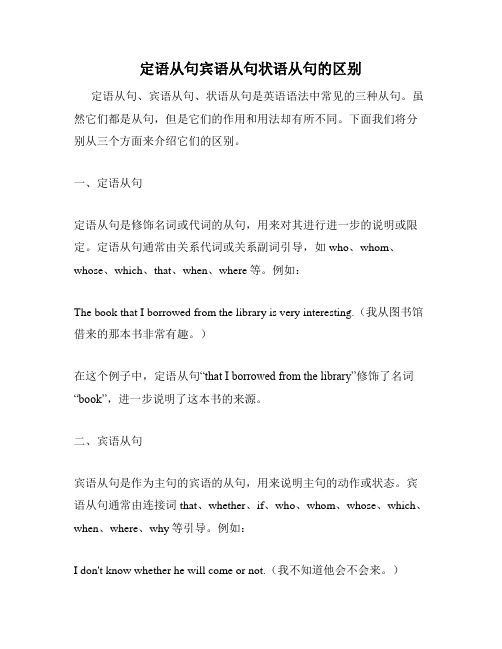
定语从句宾语从句状语从句的区别定语从句、宾语从句、状语从句是英语语法中常见的三种从句。
虽然它们都是从句,但是它们的作用和用法却有所不同。
下面我们将分别从三个方面来介绍它们的区别。
一、定语从句定语从句是修饰名词或代词的从句,用来对其进行进一步的说明或限定。
定语从句通常由关系代词或关系副词引导,如who、whom、whose、which、that、when、where等。
例如:The book that I borrowed from the library is very interesting.(我从图书馆借来的那本书非常有趣。
)在这个例子中,定语从句“that I borrowed from the library”修饰了名词“book”,进一步说明了这本书的来源。
二、宾语从句宾语从句是作为主句的宾语的从句,用来说明主句的动作或状态。
宾语从句通常由连接词that、whether、if、who、whom、whose、which、when、where、why等引导。
例如:I don't know whether he will come or not.(我不知道他会不会来。
)在这个例子中,宾语从句“whether he will come or not”作为主句的宾语,说明了主句的不确定性。
三、状语从句状语从句是用来修饰主句中的动作或状态的从句,通常由连接词if、when、while、although、because、since、as、unless等引导。
例如:Although it was raining heavily, he still went out for a walk.(尽管下着大雨,他还是出去散步了。
)在这个例子中,状语从句“Although it was raining heavily”修饰了主句中的动作“he still went out for a walk”,说明了他的行为与外界环境的不协调性。
如何区分宾语从句、定语从句、状语从句,一篇文章就够了
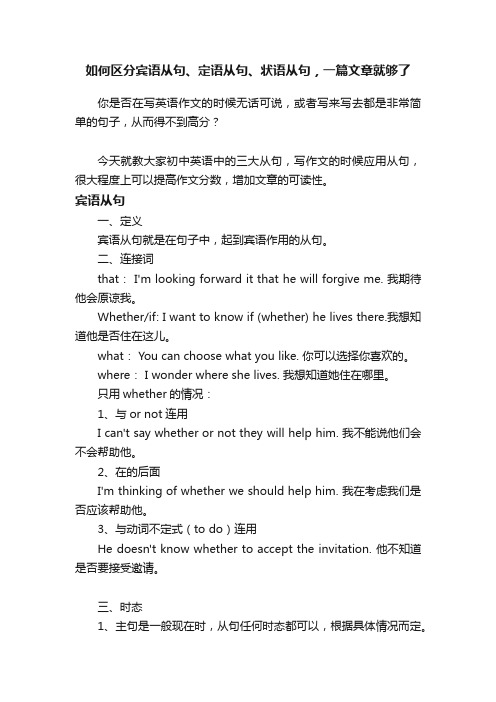
如何区分宾语从句、定语从句、状语从句,一篇文章就够了你是否在写英语作文的时候无话可说,或者写来写去都是非常简单的句子,从而得不到高分?今天就教大家初中英语中的三大从句,写作文的时候应用从句,很大程度上可以提高作文分数,增加文章的可读性。
宾语从句一、定义宾语从句就是在句子中,起到宾语作用的从句。
二、连接词that: I'm looking forward it that he will forgive me. 我期待他会原谅我。
Whether/if: I want to know if (whether) he lives there.我想知道他是否住在这儿。
what: You can choose what you like. 你可以选择你喜欢的。
where: I wonder where she lives. 我想知道她住在哪里。
只用whether的情况:1、与or not连用I can't say whether or not they will help him. 我不能说他们会不会帮助他。
2、在的后面I'm thinking of whether we should help him. 我在考虑我们是否应该帮助他。
3、与动词不定式(to do)连用He doesn't know whether to accept the invitation. 他不知道是否要接受邀请。
三、时态1、主句是一般现在时,从句任何时态都可以,根据具体情况而定。
I wants to know what she has to take an examination.我想知道她有没有参加考试。
2、主句是一般过去时态,从句用相应的过去时态。
he said that he was a student. 他说他是一个学生。
he said that he would fly to Canada in a week. 他说他要飞到加拿大一个星期。
中考英语三大从句(宾语从句、状语从句、定语从句)
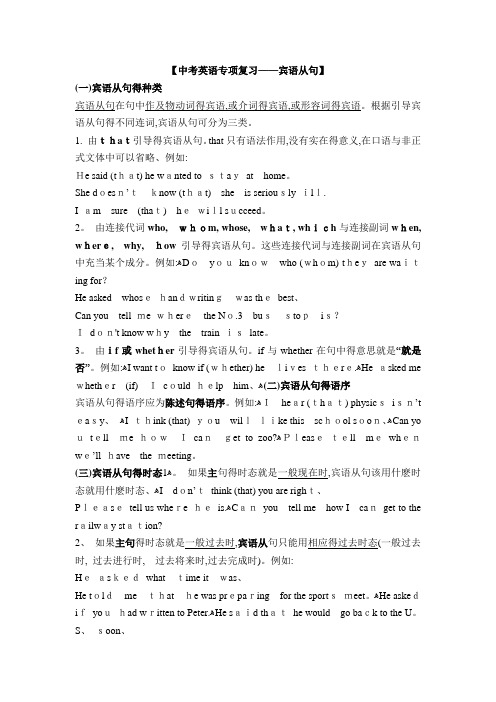
【中考英语专项复习——宾语从句】(一)宾语从句得种类宾语从句在句中作及物动词得宾语,或介词得宾语,或形容词得宾语。
根据引导宾语从句得不同连词,宾语从句可分为三类。
1. 由that引导得宾语从句。
that只有语法作用,没有实在得意义,在口语与非正式文体中可以省略、例如:He said (that) he wanted to stayat home。
She doesn’tknow (that)she is seriously ill.I am sure(that)hewill succeed。
2。
由连接代词who,whom, whose,what, which与连接副词when, where,why,how引导得宾语从句。
这些连接代词与连接副词在宾语从句中充当某个成分。
例如:ﻫDoyouknowwho (whom) theyare waiting for?He asked whosehandwritingwas thebest、Can you tell me wherethe No.3busstopis?Idon't know why the train islate。
3。
由if或whether引导得宾语从句。
if与whether在句中得意思就是“就是否”。
例如:ﻫI want toknow if (whether) helives there.ﻫHe asked me whether(if)Icould help him、ﻫ(二)宾语从句得语序宾语从句得语序应为陈述句得语序。
例如:ﻫIhear (that) physicsisn’t easy、ﻫI think (that) you willlike this school soon、ﻫCan yo utellme howIcanget to zoo?ﻫPleasetell mewhenwe’ll have the meeting。
(三)宾语从句得时态1ﻫ。
英语各种从句的详细讲解

英语各种从句的详细讲解英语从句(Subordination)英语从句主要有定语从句,状语从句和名词性从句(主语从句,宾语从句,表语从句,同位语从句)一.定语从句1.定语从句:由关系代词who,whom,whose,that,which;关系副词when,where,why引导。
1.The death notices tell us about people who have died during the week.2.The man(whom)you spoke to just now is my friend.3.The building whose lights are on is beautiful.4.Please find a place which we can have a private talk in.5.The knee is the joint where the thighbone meets the large bone of the lower leg.6.He still remembers the day when he went to school.7.It is no need telling us the reason why you didn't finish it in time.8.He has three sons,two of whom died in the war.9.Mr.Smith,whose wife is a clerk,teaches us English.10.In the Sunday paper there are comics,which children enjoy.2.只能用that和who引导的定语从句A.all,nothing,anything,a few,one做先行词指物时B.先行词前有形容词最高级修饰时,后面常跟that而不是which.C.先行词前有the only,the first,the last,the next,the very 等词修饰时,引导词只能用that。
宾语从句,状语从句,定语从句,表语从句的详细讲解及例句

当我们学习语法时,我们常常会遇到几种从句,包括宾语从句、状语从句、定语从句和表语从句。
下面逐个进行详细讲解,并给出相应的例句。
1. 宾语从句(Object Clause):宾语从句用来做主句中的宾语。
它通常由连接词引导,如that, if, whether, what, where, who, whom, whose等。
例句:- I don't know what he wants.(我不知道他想要什么。
)- She asked if he could come to the party.(她问他是否能来参加派对。
)- They wonder where we are going.(他们想知道我们要去哪里。
)2. 状语从句(Adverbial Clause):状语从句用来修饰主句中的动词、形容词、副词,表示时间、地点、原因、条件、结果等。
它通常由连接词引导,如when, while, because, if, although, since等。
例句:- We will go hiking if the weather is good.(如果天气好,我们将去远足。
)- He studied hard until he passed the exam.(他学习努力直到通过考试。
)- Although it was raining, they still went out.(虽然下雨了,他们仍然出去了。
)3. 定语从句(Relative Clause):定语从句用来修饰主句中的名词或代词,对其进行限定或说明。
它通常由关系代词引导,如that, which, who, whom, whose等。
例句:- The book that I bought yesterday is very interesting.(我昨天买的那本书很有趣。
)- The person who is talking to Mary is my brother.(正在和玛丽说话的那个人是我哥哥。
初中英语3大从句:宾语从句,定语从句,状语从句详解
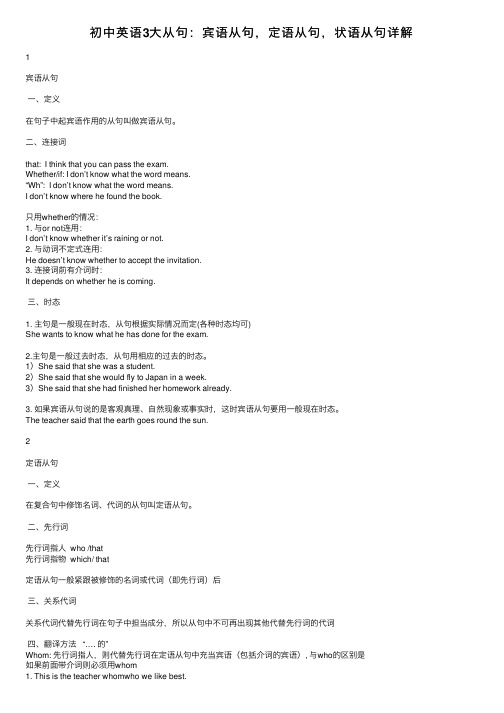
初中英语3⼤从句:宾语从句,定语从句,状语从句详解1宾语从句⼀、定义在句⼦中起宾语作⽤的从句叫做宾语从句。
⼆、连接词that: I think that you can pass the exam.Whether/if: I don’t know what the word means.“Wh”: I don’t know what the word means.I don’t know where he found the book.只⽤whether的情况:1. 与or not连⽤:I don’t know whether it’s raining or not.2. 与动词不定式连⽤:He doesn’t know whether to accept the invitation.3. 连接词前有介词时:It depends on whether he is coming.三、时态1. 主句是⼀般现在时态,从句根据实际情况⽽定(各种时态均可)She wants to know what he has done for the exam.2.主句是⼀般过去时态,从句⽤相应的过去的时态。
1)She said that she was a student.2)She said that she would fly to Japan in a week.3)She said that she had finished her homework already.3. 如果宾语从句说的是客观真理、⾃然现象或事实时,这时宾语从句要⽤⼀般现在时态。
The teacher said that the earth goes round the sun.2定语从句⼀、定义在复合句中修饰名词、代词的从句叫定语从句。
⼆、先⾏词先⾏词指⼈ who /that先⾏词指物 which/ that定语从句⼀般紧跟被修饰的名词或代词(即先⾏词)后三、关系代词关系代词代替先⾏词在句⼦中担当成分,所以从句中不可再出现其他代替先⾏词的代词四、翻译⽅法 “…. 的”Whom: 先⾏词指⼈,则代替先⾏词在定语从句中充当宾语(包括介词的宾语), 与who的区别是如果前⾯带介词则必须⽤whom1. This is the teacher whomwho we like best.2. I don’t like the boy to whom you are talking.Whose : 指⼈或物,作定语,表⽰ “…的”eg: Harry is the boy whose mother is our math teacher.关系代词只能 that 的特殊情况:1.先⾏词前有序数词修饰时:This is the first gift that my parents bought me.2.先⾏词前有形容词最⾼级修饰时:This is the most exciting film that I have ever seen.3. 先⾏词是不定代词something, anything等时.e.g. Is there anything that you want in this shop4. 先⾏词是⼈和物时, ⽤that.e.g. He talked about some writers and books that were unknown to us all.5. 先⾏词被all , little , the only , the very(就是,正是), the last 等词修饰时,只能⽤thate.g. This is the last place that I want to visit.6. 特殊疑问句以who 或which 开头,只能⽤that引导.Who is the girl that is making a speech on the platform?当关系代词前使⽤介词时:物+介词+which ; ⼈+ 介词 + whom当关系代词前使⽤介词时:e.g. 1. This is the train by which we went to Beijing.2. This is the teacher to whom my mother is talking.3状语从句⼀、定义在复合句中由从句表⽰的状语称作状语从句,它可以⽤来修饰谓语(包括⾮谓语动词)、定语或状语,或是整个句⼦。
宾语从句 定语从句 状语从句 表语从句
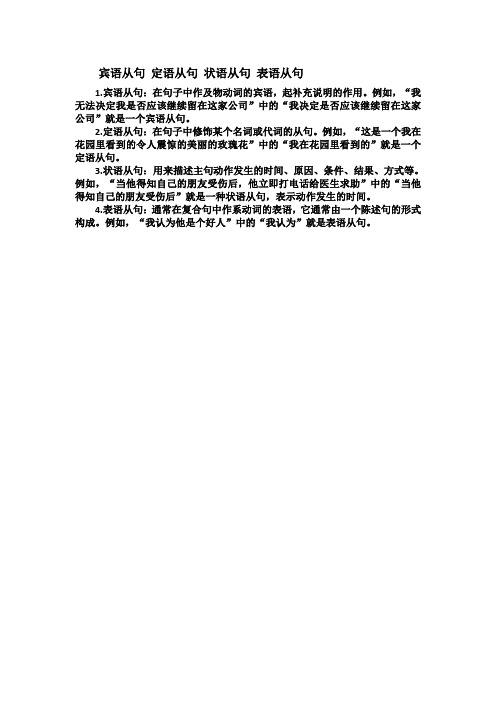
宾语从句定语从句状语从句表语从句
1.宾语从句:在句子中作及物动词的宾语,起补充说明的作用。
例如,“我无法决定我是否应该继续留在这家公司”中的“我决定是否应该继续留在这家公司”就是一个宾语从句。
2.定语从句:在句子中修饰某个名词或代词的从句。
例如,“这是一个我在花园里看到的令人震惊的美丽的玫瑰花”中的“我在花园里看到的”就是一个定语从句。
3.状语从句:用来描述主句动作发生的时间、原因、条件、结果、方式等。
例如,“当他得知自己的朋友受伤后,他立即打电话给医生求助”中的“当他得知自己的朋友受伤后”就是一种状语从句,表示动作发生的时间。
4.表语从句:通常在复合句中作系动词的表语,它通常由一个陈述句的形式构成。
例如,“我认为他是个好人”中的“我认为”就是表语从句。
宾语从句状语从句定语从句的区别
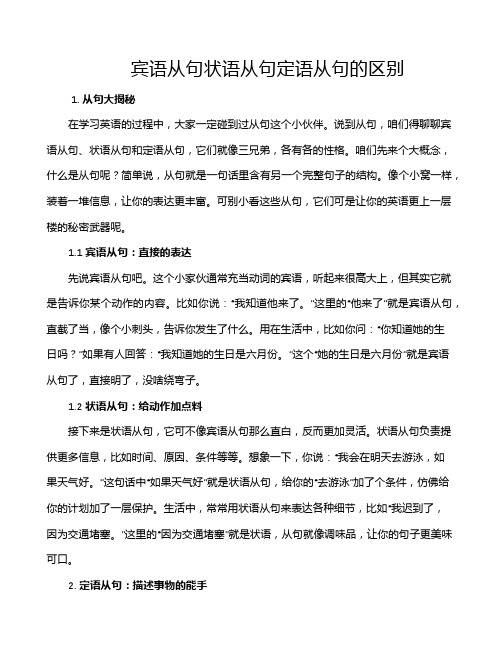
宾语从句状语从句定语从句的区别1. 从句大揭秘在学习英语的过程中,大家一定碰到过从句这个小伙伴。
说到从句,咱们得聊聊宾语从句、状语从句和定语从句,它们就像三兄弟,各有各的性格。
咱们先来个大概念,什么是从句呢?简单说,从句就是一句话里含有另一个完整句子的结构。
像个小窝一样,装着一堆信息,让你的表达更丰富。
可别小看这些从句,它们可是让你的英语更上一层楼的秘密武器呢。
1.1 宾语从句:直接的表达先说宾语从句吧。
这个小家伙通常充当动词的宾语,听起来很高大上,但其实它就是告诉你某个动作的内容。
比如你说:“我知道他来了。
”这里的“他来了”就是宾语从句,直截了当,像个小刺头,告诉你发生了什么。
用在生活中,比如你问:“你知道她的生日吗?”如果有人回答:“我知道她的生日是六月份。
”这个“她的生日是六月份”就是宾语从句了,直接明了,没啥绕弯子。
1.2 状语从句:给动作加点料接下来是状语从句,它可不像宾语从句那么直白,反而更加灵活。
状语从句负责提供更多信息,比如时间、原因、条件等等。
想象一下,你说:“我会在明天去游泳,如果天气好。
”这句话中“如果天气好”就是状语从句,给你的“去游泳”加了个条件,仿佛给你的计划加了一层保护。
生活中,常常用状语从句来表达各种细节,比如“我迟到了,因为交通堵塞。
”这里的“因为交通堵塞”就是状语,从句就像调味品,让你的句子更美味可口。
2. 定语从句:描述事物的能手然后咱们来聊聊定语从句,它就是用来描述名词的。
听起来复杂,其实定语从句能帮你更具体地表达一个事物。
比如说:“这是我最喜欢的书,它讲述了一个勇敢的故事。
”这里的“它讲述了一个勇敢的故事”就是定语从句,给“书”加上了更多的背景,让听的人脑海中浮现出一个生动的画面。
定语从句就像你给朋友介绍某个新朋友时,提供详细资料一样,让对方更了解这个人。
2.1 在生活中的运用在日常生活中,这三种从句经常混在一起,真是让人有点头疼。
不过,掌握了它们,你会发现表达变得更加自如。
英语中五大从句
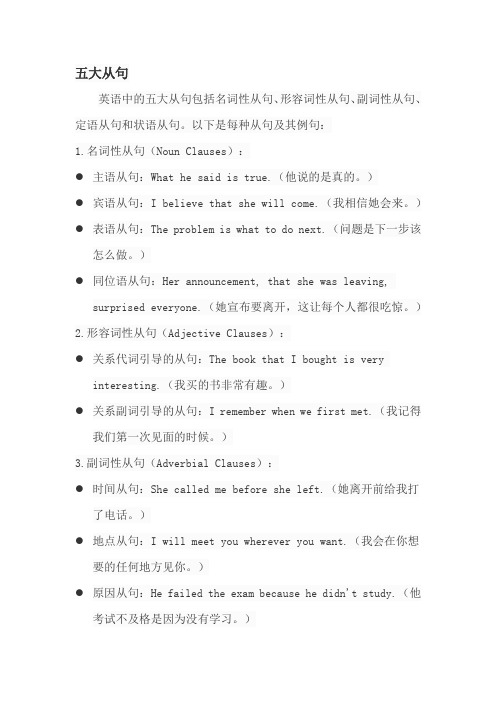
五大从句英语中的五大从句包括名词性从句、形容词性从句、副词性从句、定语从句和状语从句。
以下是每种从句及其例句:1.名词性从句(Noun Clauses):●主语从句:What he said is true.(他说的是真的。
)●宾语从句:I believe that she will come.(我相信她会来。
)●表语从句:The problem is what to do next.(问题是下一步该怎么做。
)●同位语从句:Her announcement, that she was leaving,surprised everyone.(她宣布要离开,这让每个人都很吃惊。
)2.形容词性从句(Adjective Clauses):●关系代词引导的从句:The book that I bought is veryinteresting.(我买的书非常有趣。
)●关系副词引导的从句:I remember when we first met.(我记得我们第一次见面的时候。
)3.副词性从句(Adverbial Clauses):●时间从句:She called me before she left.(她离开前给我打了电话。
)●地点从句:I will meet you wherever you want.(我会在你想要的任何地方见你。
)●原因从句:He failed the exam because he didn't study.(他考试不及格是因为没有学习。
)●条件从句:If it rains, we will stay indoors.(如果下雨,我们将呆在室内。
)●结果从句:He worked hard, so he succeeded.(他努力工作,所以成功了。
)4.定语从句(Adjective Clauses):●关系代词引导的从句:The man who is talking to my mother ismy uncle.(正在和我妈妈交谈的那个人是我叔叔。
英语从句到底有几种?

英语从句Clauses∙英语里一共有3种从句,分别为:状语从句,定语从句,名词性从句。
∙另外,此文将并列句列入状语从句范畴(不考虑句子重要性),因为并列句也需要借助连词。
一、状语从句:∙性质:属于状语性质,对主句语法无影响。
∙连接词:连词,如:if, when, because, as, for, even if, and, so等。
e.g. When we are talking, she comes.e.g. If you are here, you will love it.二、定语从句:∙性质:属于形容词性质,对主句语法无影响。
∙连接词:也叫关系词,包括“关系代词”和“关系副词”。
∙关系代词:which, who, that; whom, whose, as等。
∙关系副词:when, where, whye.g. I know the man who wears a hat.e.g. This is the place where I grew up.三、名词性从句:∙性质:属于名词性质,对主句语法有影响。
∙连接词:“疑问词”和“that”∙包括:主语从句,宾语从句,表语从句,同位语从句。
e.g. Whatever you do is right.e.g. That we will get more equipment is for sure.温馨提示:1. 从句是一个句子的次要成分,不能跟主句的重要性弄混;2. 状语从句就是由连词引导的从句;3. 定语从句就是由关系词引导的从句;4. 名词性从句就是由疑问词或that引导的从句;5. 虽然名词性从句有4种,但一定不要想得那么难,都是一样的,只是从句放的位置不一样。
同位语从句要用到的名词更是少之又少。
《英语全解析》By Bill Lee。
初中英语从句的分类

初中英语从句的分类从句是相对于主句而言的, 即它是从属于某一个主句, 而不能单独作一个句子。
在英语中主 要有三大从句,即:1. 名词性从句(包括主语从句,宾语从句,表语从句,同位语从句 )2. 定语从句3•状语从句(包括时间、条件、结果、目的、原因、让步、地点、方式等 )。
1) 主语从句用作主语,如: That the earth is round is true. 地球是圆的是真实的。
2) 宾语从句用作宾语。
如: Do you know where he lives 3) 表语从句用作表语,如:My opinion is that you should not go alone. 4) 同位语从句用于解释说明前面的名词。
如: The fact that the earth is round is true. 句用于解释说明the fact )5)定语从句相当于一个形容词,用于修饰前面的名词。
如: The stude nt who an swered the questi on was Joh n. 6)状语从句相当于一个副词,如: When it rain s, I usually go to school by bus. (时间状语)If he comes tomorrow, you will see him. 导的条件状语从句,其结构为:if +状语从句,“主将从现”,即主句是将来时,则从句要用一般现在时表示将来。
He returned home to lear n his daughter had just bee n en gaged.他回家后得知女儿刚刚订婚了。
(结果状语,结果状语只是仅限于 learn (得知),find (发现),see ,hear ,我的意见是你不应单独前往。
地球是圆的的事实是真实的。
(that 从回答问题的学生是 Joh n.天下雨时,我通常坐公共汽车上学。
英语八大从句类型总结

英语八大从句类型总结主句和从句的划分方法是相同的。
句子的成分从谓语动词处来划分比较容易。
今天我们就一起来看看英语八大从句类型总结吧!英语八大从句类型总结从句是相对于主句而言的,即它是从属于某一个主句,而不能单独作一个句子。
在英语中,主要有三大从句,即名词性从句(包括主语从句,宾语从句,表语从句,同位语从句)、形容词性从句(即定语从句)、副词性从句(即状语从句,包括时间、条件、结果、目从句是相对于主句而言的,即它是从属于某一个主句,而不能单独作一个句子。
在英语中,主要有三大从句,即名词性从句(包括主语从句,宾语从句,表语从句,同位语从句)、形容词性从句(即定语从句)、副词性从句(即状语从句,包括时间、条件、结果、目的、原因、让步、地点、方式等)。
主语从句用作主语,如::That the earth is round is true.地球为圆的是真实的。
宾语从句用作宾语。
如:Do you know where he lives?表语从句用作表语,如:XXX is that you should not go alone.我的意见是你不应单独前往。
同位语从句用于解释说明前面的名词。
如:The fact that the earth is round is true.地球是圆的的究竟是实在的。
(that从句用于解释申明the fact)定语从句相当于一个形容词,用于修饰前面的名词。
如:XXX XXX XXX.回覆下列问题的学生是XXX.状语从句相当于一个副词,如:When it rains,I usually go to school by bus.天下雨时,我通常坐大众汽车上学。
(工夫状语)If XXX,you will see him.假如他明天来,你就可以瞥见他。
(if引导的前提状语从句,其结构为:if +状语从句,+主句)。
要留意在状语从句中有一个规则是“主将从现”,即主句是未来时,则从句要用普通目前时表示未来。
中考英语宾语从句 定语从句和状语从句知识点总结
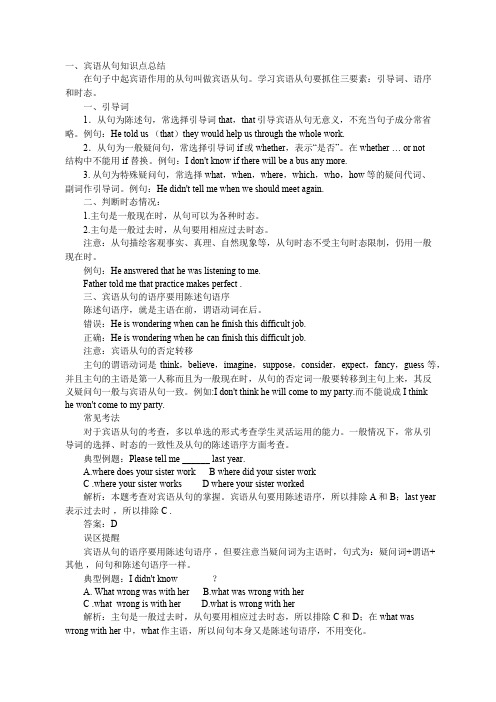
一、宾语从句知识点总结在句子中起宾语作用的从句叫做宾语从句。
学习宾语从句要抓住三要素:引导词、语序和时态。
一、引导词1.从句为陈述句,常选择引导词that,that引导宾语从句无意义,不充当句子成分常省略。
例句:He told us (that)they would help us through the whole work.2.从句为一般疑问句,常选择引导词if或whether,表示“是否”。
在whether … or not结构中不能用 if 替换。
例句:I don't know if there will be a bus any more.3. 从句为特殊疑问句,常选择what,when,where,which,who,how等的疑问代词、副词作引导词。
例句:He didn't tell me when we should meet again.二、判断时态情况:1.主句是一般现在时,从句可以为各种时态。
2.主句是一般过去时,从句要用相应过去时态。
注意:从句描绘客观事实、真理、自然现象等,从句时态不受主句时态限制,仍用一般现在时。
例句:He answered that he was listening to me.Father told me that practice makes perfect .三、宾语从句的语序要用陈述句语序陈述句语序,就是主语在前,谓语动词在后。
错误:He is wondering when can he finish this difficult job.正确:He is wondering when he can finish this difficult job.注意:宾语从句的否定转移主句的谓语动词是think,believe,imagine,suppose,consider,expect,fancy,guess等,并且主句的主语是第一人称而且为一般现在时,从句的否定词一般要转移到主句上来,其反义疑问句一般与宾语从句一致。
- 1、下载文档前请自行甄别文档内容的完整性,平台不提供额外的编辑、内容补充、找答案等附加服务。
- 2、"仅部分预览"的文档,不可在线预览部分如存在完整性等问题,可反馈申请退款(可完整预览的文档不适用该条件!)。
- 3、如文档侵犯您的权益,请联系客服反馈,我们会尽快为您处理(人工客服工作时间:9:00-18:30)。
复合句:由一个主句和一个或一个以上的从句构成的句子叫做复合句。
主句是句子的主体,从句只用作句子的一个成分,不能独立。
从句可以担任复合句的主语(主语从句)、表语(表语从句)、宾语(宾语从句)、定语(定语从句)、状语(状语从句)。
中学阶段主要学习含有状语从句、宾语从句、定语从句的复合句。
A.状语从句:在复合句中修饰主句中的动词、形容词或副词等的从句叫做状语从句。
状语从句根据它表示的意思的不同可分为时间、地点、原因、结果、让步、比较(或方式)和条件等类。
○1时间状语从句:由when, while, as, the moment, the minute, once, whenever, before, after,○2条件状语从句:由if, unless, so long as, as long as, in case , if only, provided that等引导。
(注:在条件状语从句的将来时态要用现在时和过去时,表示相应的将来时)。
I’ll show you around the city if I am free tomorrow . / If I had enough money, I would buy the car○3原因状语从句:由because(因为), as(由于), since(既然), for(因为)等引导。
He was absent yesterday because he was ill . / As it was already dark, they decided to stay in the town for the night .○4目的状语从句:由so that, that, so, in order that, in case等引导。
句中常有may, might, can,could, should, would等情态动词。
He got up early so that he could catch the early train. / He studied hard in order that he might succeed .○5结果状语从句:由so…that, so, so that, such…that等。
The film is so interesting that everyone likes to see it again . / Nothing more was heard of him, so people thought that he was dead .○6比较状语从句:由than, as…as, not as(so)…as, the(+比较级)…the(+比较级)等引导。
Today is not as warm as yesterday. / He listens to the teacher more carefully than I .○7地点状语从句:由where 和wherever等引导。
地点状语从句位于句首时,常用逗号与主句隔开;位于句末时则不用逗号。
He follows her wherever she goes .○8方式状语从句:由as, just as…so, as if 等。
As if 引导的从句的时态要用过去时(虚语语气)。
Please do as I do . / He tells me the whole thing as if he knew everything .○9让步状语从句:由though, although, even if, even though, however, whatever, no matter who等引导。
Although he has failed many times, he doesn’t give up trying .B○1宾语从句的连词。
如果宾语从句是从陈述句变化而来的,要用连词that来引导,that可以省略。
如果宾语从句是从一般疑问句变化而来的,要用连词if或whether .如果宾语从句是从特殊疑问句变化而来的,连词就应该用特殊疑问词(what, when, where…)。
○2宾语从句的时态:○3宾语从句的人称:人称代词要随合理的逻辑而自然变化。
She said, “I am much better than before.”--------She said that she was much better than before . ○4when 和if 在引导宾语从句和状语从句中,后面的时态有差别。
I don’t know when (何时)she will be back(宾语从句), but when(当…时候) she comes back, I’ll let you know(状语从句).I don’t know if(是否) she will come back(宾语从句), but if (如果)she comes back, I’ll let you know (状语从句).C.定语从句:在复合句中修饰名词或代词的从句叫做定语从句,被定语从句修饰的名词或代词叫先行词,定语从句必须放在先行词之后。
引导从句的关系代词有:who(人,主格), whom(人,宾客), whose(人,所有格), which(物), that(人,物)。
引导从句的关系副词有:where(地点), when(时间), why(原因)。
We will never主句/先行词从句主句主句/ 先行词从句主句/ 先行词从句○1从句的谓语动词和先行词的关系。
主谓关系:He asked the man(作从句主语) who/that was smoking .动宾关系:The noodles(作从句宾语) that/which I cooked were delicious .○2只能用that 的情况:先行词为all, any, few, no, some, much, little等修饰。
I have done all the work that he told us to do .先行词被序数词修饰。
That last/first question that he asked me was hard to answer .先行词同时有人和物。
They often talk about things and persons that they remember .先行词是everything, anything, nothing, none等不定代词。
I remembered everything that the teachers taught me before .先行词被形容词最高级修饰。
That is the best book that I have read .先行词被the very, the only, the same修饰。
It is the very book that I am looking for .先行词是主句的表语或关系代词在定语从句中作表语。
China is no longer the country that it used to be .先行词是指示代词that, one, those, this, another, all等。
Is this school the one that I saw in the picture ?主句以who / which开头,定语从句用that 。
who is the girl that spoke to you just now ? / which is the car that was made in China ?○3只能用which的情况:关系代词前有介词。
This is the house in which we lived last year .先行词本身是that 。
The clock is that which I bought yesterday .非限制性定语从句。
His English , which used to be very poor, is now excellent .○4定语从句在句中作定语,所以在使用时,相当于现在分词短语,过去分词短语,动词不定式短语,介词短语作后置定语的句子。
a.I bought a book that was written by Lu Xun . = I bought a book written by Lu Xun .b.Tell the children who are playing basketball not to do that . = Tell the children playing basketball not to do that .c.The house that stands at the corner was built in 1987 . = The house standing at the corner was built in 1987 .d.We have nothing that we should fear . = We have nothing to fear .e.The book that is on the table is expensive . = The book on the table is expensive .○5引导词when, where和why可用相应的表示时间(in, on, at, during等)、地点(in, on, at等)和原因(for)的介词+which 表达为介宾结构。
a.I still remember the day when I met her for the first time . ---- I still remember the day on whichI met her for the first time .b.That is the place where I went when I was a child . ----- That is the place to which I went when I was a child .c.May I know the reason why you are late ? ----- May I know the reason for which you are late ?○6在定语从句中,不能再出现指示先行词的指示代词。
I just can’me .(×)---- I just can’t find the book which/that she lent to me .(√)○7注意下面的变化:This is the house(不作lived的宾语) where we lived last year .This is the house(作lived in的宾语) which/that we lived in last year .This is the day (不作left的宾语)when we left for Shenzhen .This is the day (作spent的宾语)which/that we spent in Shenzhen .○8限制性定语从句和非限制性定语从句的区别:限制性定语从句:是句中不可缺少的组成部分,没有从句,先行词意思不明确,主句也不完整,从句主句不用逗号分开。
